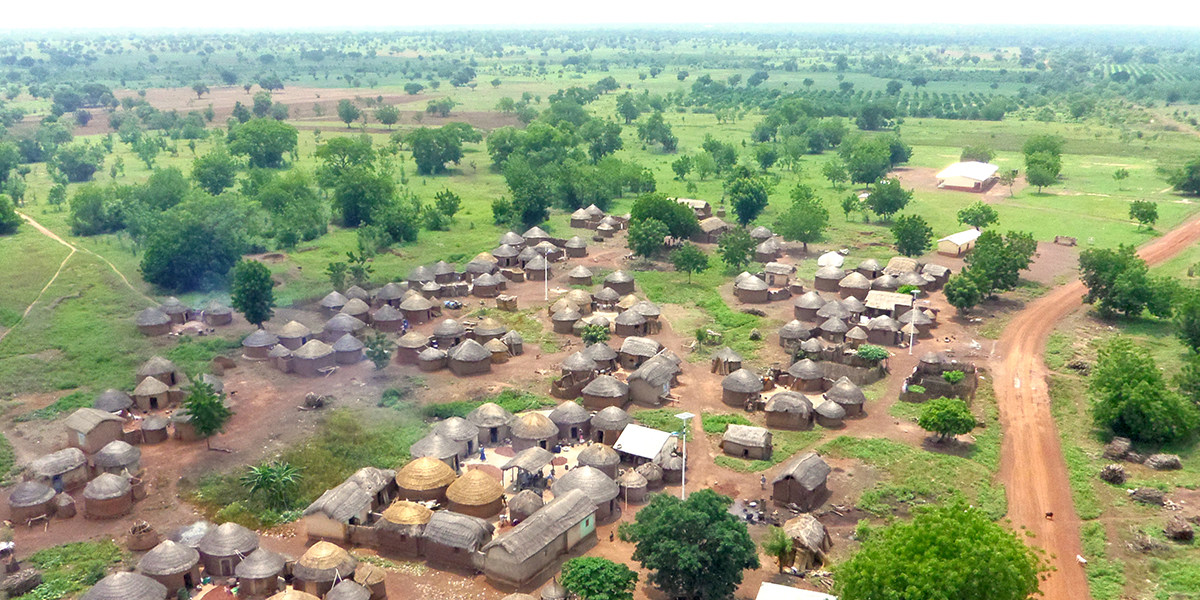Program Overview
MCC’s $547 million Ghana Compact (2007–2012) funded the$189 million Agriculture Project which included the Land Tenure Facilitation (LTF) Activity, a pilot to increase land tenure security, investment and productivity by strengthening property rights. LTF aimed to improve tenure security for land users and facilitate access to land for commercial crops through systematic provision of titles and construction and equipping Land Commission district offices to support land administration.
Key Findings
Land Registration and Tenure Security
- The treatment group was significantly more likely to report that land was registered and perceive their tenure as secure.
- Men in the treatment group were 7 percentage points (pp) less concerned over the loss of land if left it fallow than those in the control group.
Land Investment and Landholding
- Men and women in the treatment group made no substantial-land investments. They reduced and consolidated landholdings via smaller and fewer parcels, increased land purchases (7pp) and decreased sharecropping (nearly 4pp).
Labor Allocation, Productivity, and Income
- As land tenure improved, farmers in the treatment group moved their labor from agriculture to non-farm activities with off-farm business.
- As a result, women in the treatment group saw higher enterprise profits than those in the control group.
Access to Credit and Welfare
- Men borrowed higher amounts and made larger loans to others. However, these credit effects likely resulted from boosted enterprise activity.STEM programs and relationships after the compact ended in July 2019 through program accreditation and other activities.
- Women reduced their livestock holdings but saw large increases in individually owned, durable goods. Men increased both.
Evaluation Questions
This impact evaluation of the Land Tenure Facilitation Activity was designed to answer the questions below with a focus on gender-disaggregated effects to determine whether program impacts differed for women:- 1 Was the program successful in registering land in the targeted program area?
- 2 Did the land registration program translate into increased agricultural investment or credit-taking?
- 3 Is there a difference in how women and men responded to the program?
Detailed Findings
Land Registration and Tenure Security
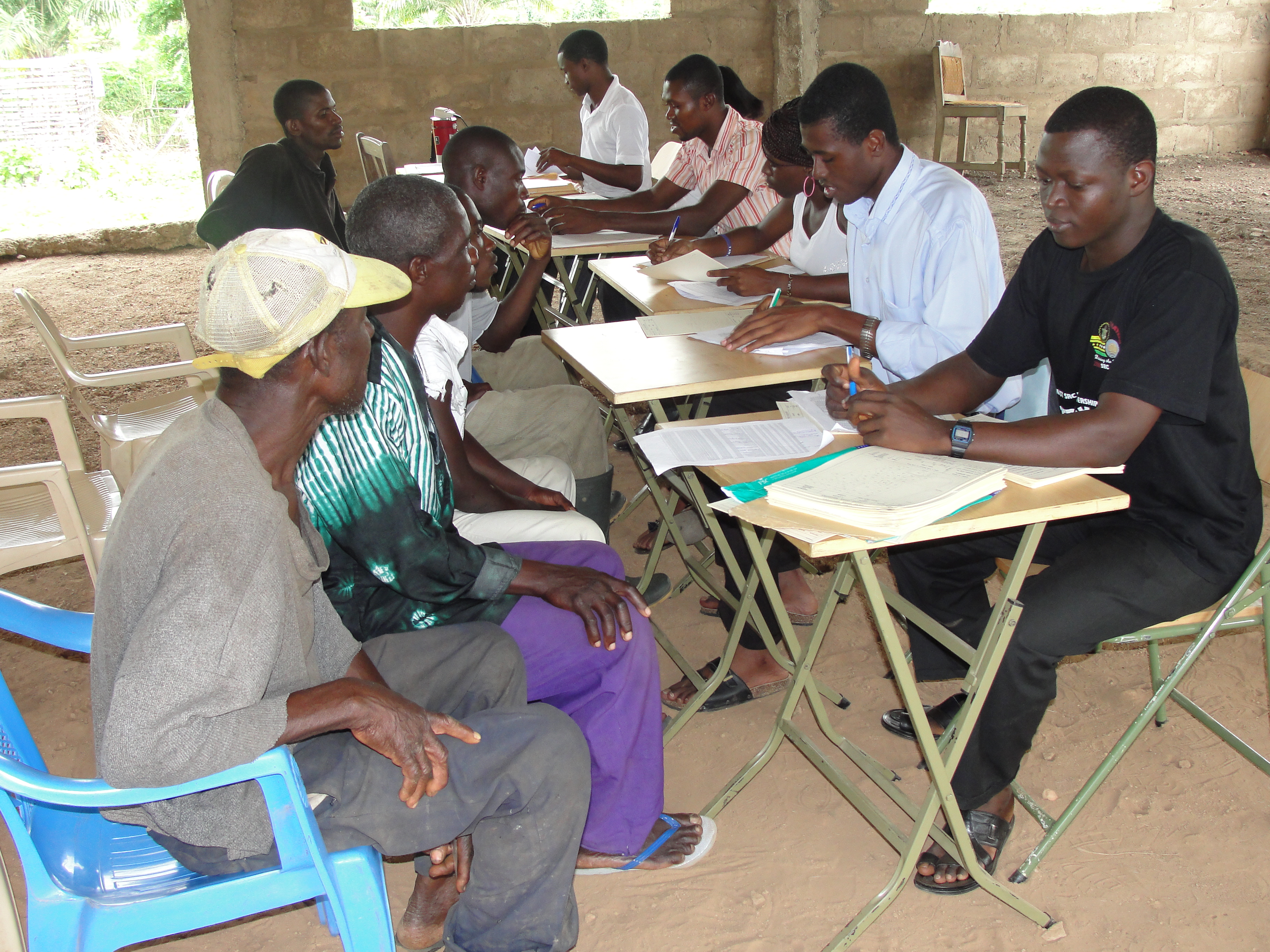
Land claimants provide land rights information and documentation to obtain titles
About one-third of the control group worried that they would lose their plot if they left it fallow, illustrating relatively high perceptions of tenure insecurity. For men in the treatment area this perception of tenure insecurity decreased by 7pp; however this effect may have tapered off in the medium-term. For women, perceived land tenure security rose 7.4pp but only seen in the last round of data collection 3 years after LTF completion.
Land Investment and Landholding
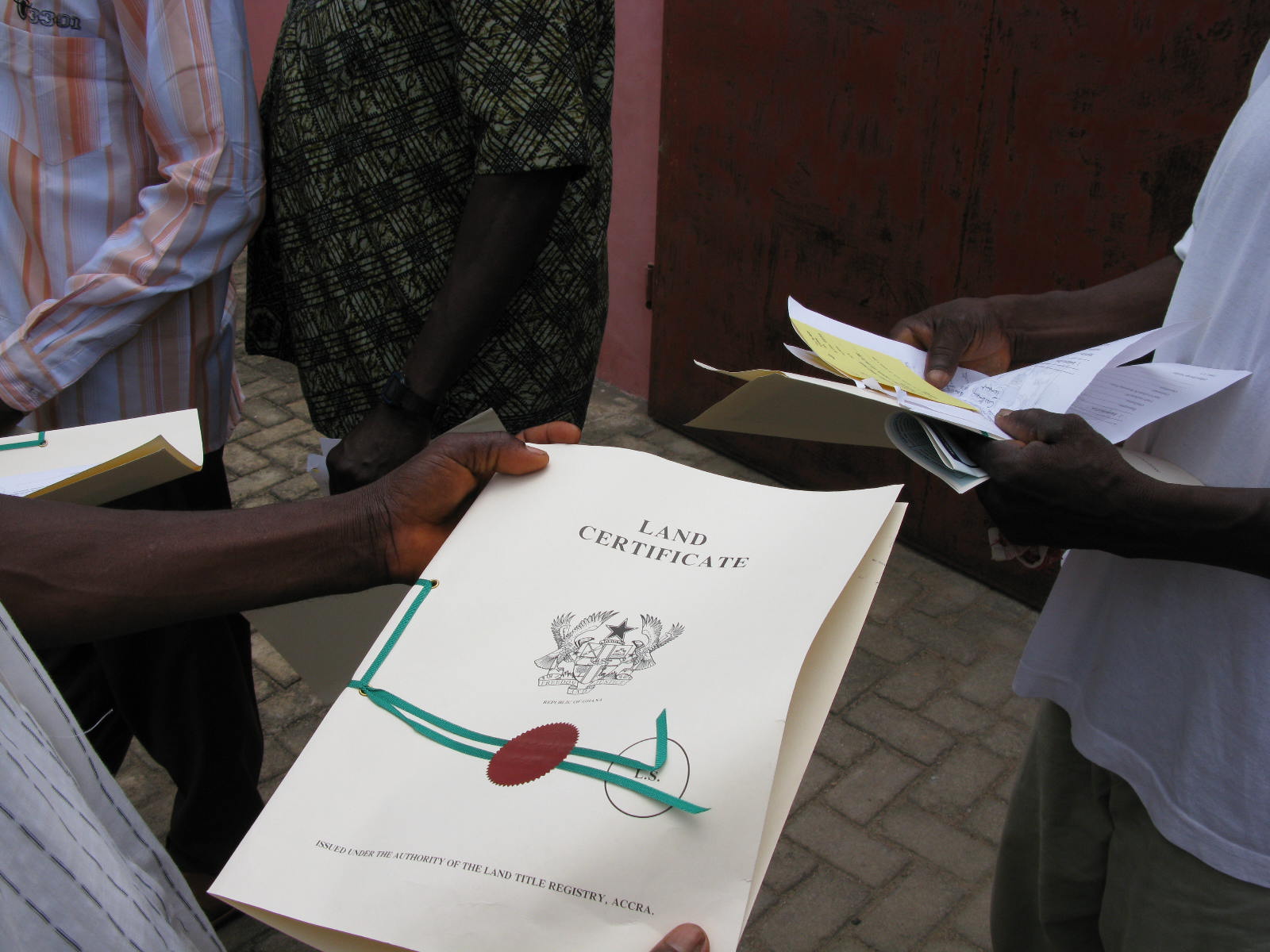
Land Certificate from the Ghanaian Land Title Registry
In treatment areas men showed no significant land investments, and women saw only an incremental increase of 4.4pp in planting trees and 1.6pp soil investment when pooling impacts over all survey rounds, with no change in land fallowing or irrigation.
Labor Allocation, Productivity, and Income
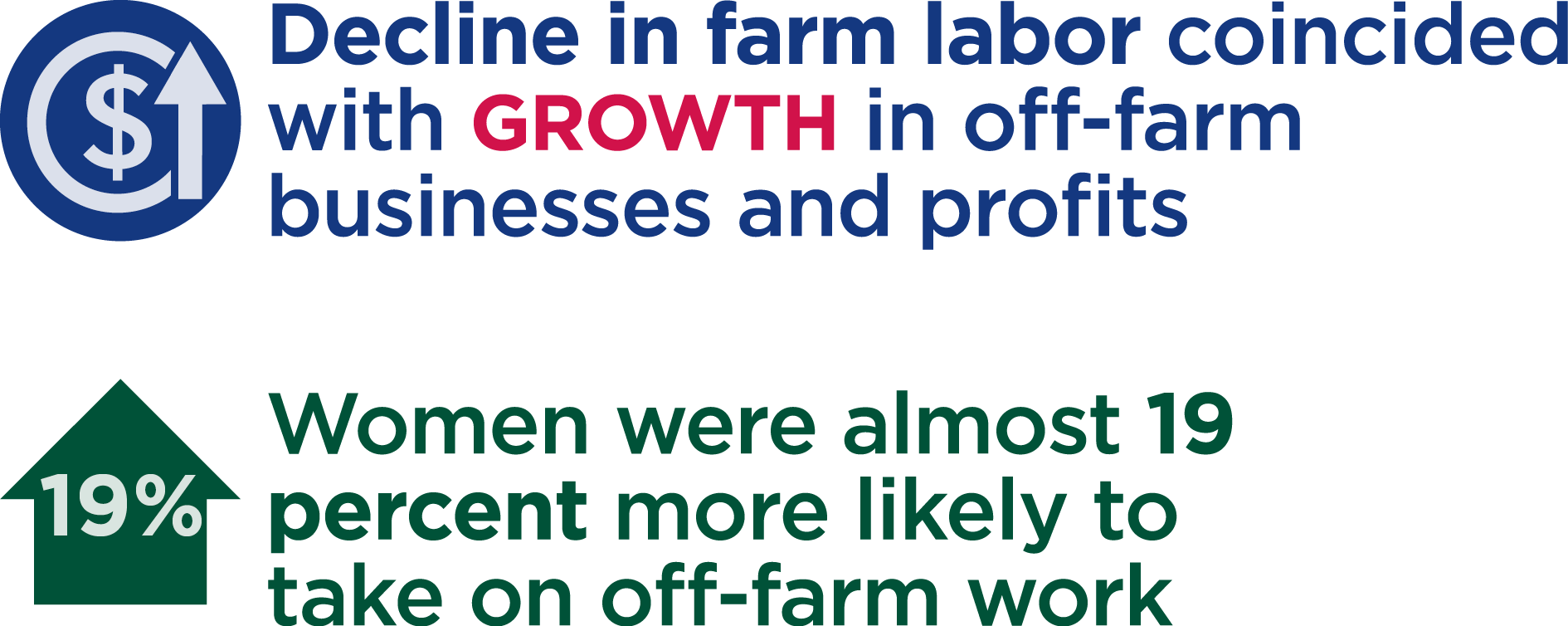
Access to Credit and Welfare
Respondents did not seek mortgages—an unsurprising finding considering that Ghana’s mortgage market is primarily in urban areas. However, men showed significant results in credit use, making much larger loans to others and borrowing higher amounts. In the long term, 33 percent of the loans in the treatment group were for business purposes, compared with 14 percent in the control group. The credit effects were likely mostly a byproduct of boosted enterprise activity.According to household asset measures, women showed a significant decline in livestock holdings—by nearly one-third in the long term. However, this decline was more than offset by large increases in other individually owned assets such as durable goods. Men, on the other hand, significantly increased the value of their livestock holdings in the long term, as well as their individually owned durable goods.
MCC Learning
- MCC’s rural development projects are often built around interdependent multisector investments; however, in practice, separate implementation of these projects often occurs as they move at different speeds with distinct stakeholders. MCC should remove dependencies except when absolutely needed or consider how to structure these investments to ensure alignment.
- Land registration does not always translate into increases in agricultural investments or credit taking. When dealing with peri-urban areas, land values often increase and can lead to off-farm labor, land sales and land consolidation.
- Dependency on demand for titles/registration of land use rights is risky, especially when there is a high cost to obtain a title or unknown demand. More attention should be paid to public awareness raising and stimulating demand for land services, especially amid first-time land registration in a country.
- Women and men, even within the same household, have distinct responses to improvements in land tenure security. In order to capture these distinct effects, land evaluation data collection modules should include spousal modules and parcel manager surveys.
- Impact evaluations dependent on household surveys benefit from triangulation with complimentary administrative data and qualitative data. This is especially true when trying to capture big picture objectives around land use administration, land transaction time, land use, land markets and land conflicts.
Evaluation Methods
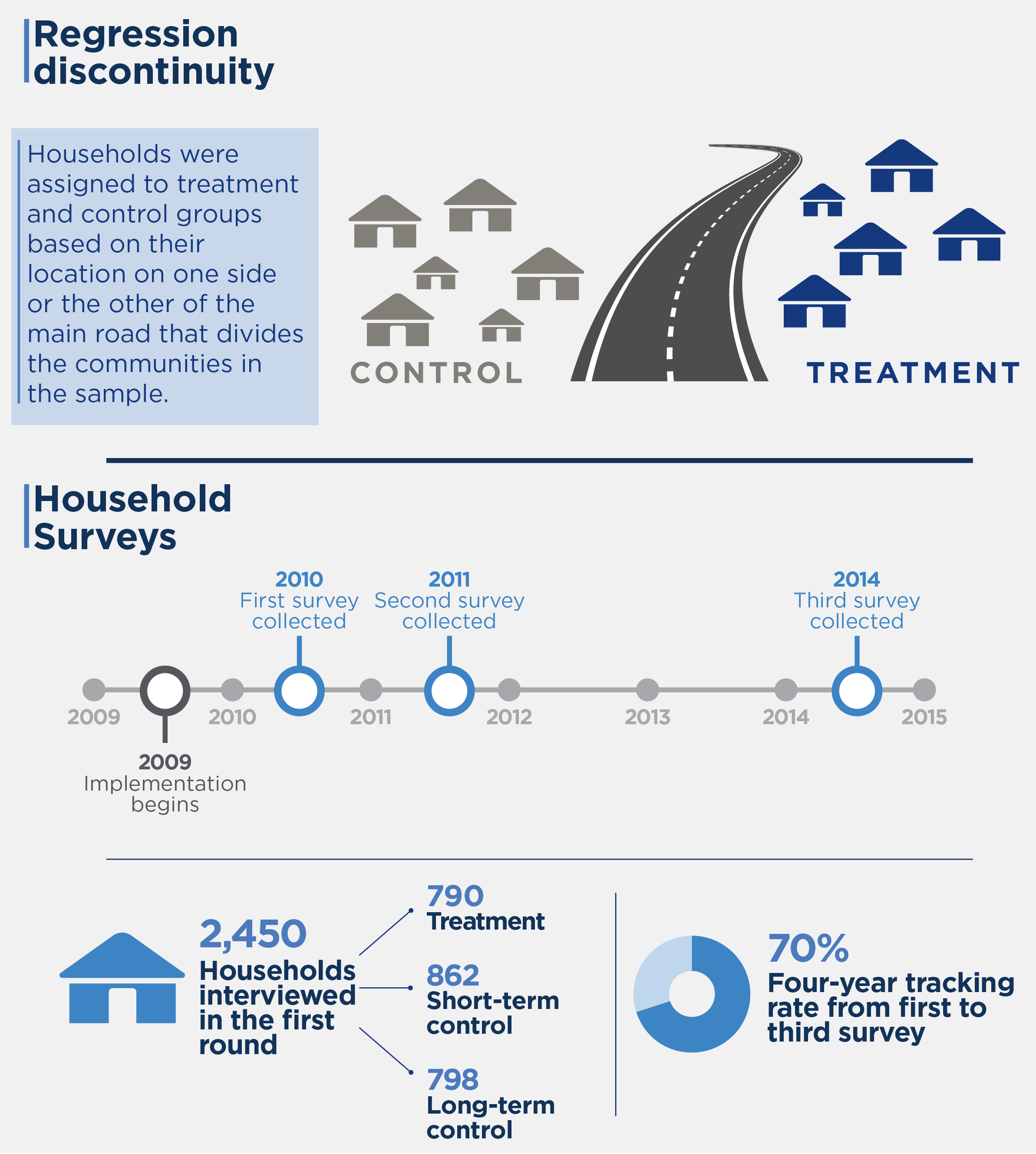
The household-level panel data were collected from households targeted by the MCC land titling pilot intervention and from households just outside the intervention area—a short-term control group and a long-term control group. Surveys were collected in 2010, 2011, and 2014 with pooled effects presented in this evaluation brief. The first two survey waves allowed the Gender Innovation Lab to understand the program’s short-term one- and two-year effects. The last wave provided insight into the medium-term program impacts, showing 3-5 year impacts after treatment households received their titles.
Each survey wave collected information on socioeconomic characteristics such as demographics, paid employment, individual and household assets, agricultural production and land titling, nonfarm enterprises, marital history of household heads and spouses, and financial literacy training. Using GPS data, the survey team also collected information on household and plot allocations.
2020-002-2348


